The Eco-Conscious Choice
Choosing moissanite as a jewelry option is an eco-conscious decision. Being lab-created, moissanite eliminates the harmful impacts of mining on the environment and its inhabitants. Its production also results in a significantly lower carbon footprint compared to diamonds or other gemstones, making it a sustainable and responsible choice.
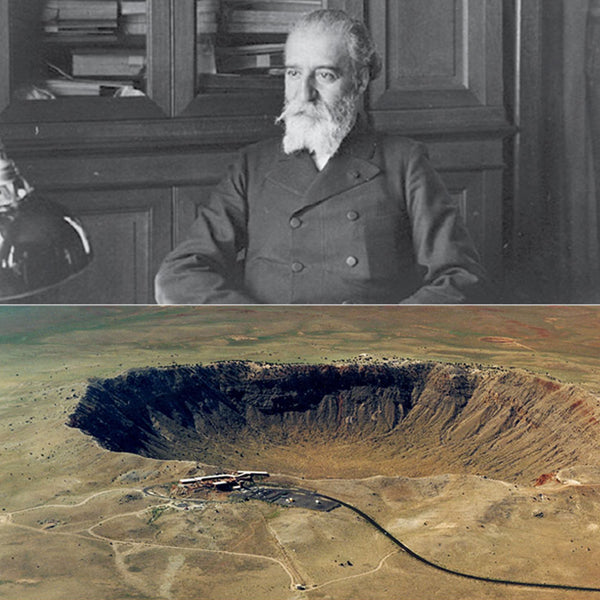
History of Moissanite
Moissanite's origins can be traced back to particles from a meteorite that smashed into the Arizona desert about 50,000 years ago.
Dr. Henri Moissan, a French scientist and Nobel Prize winner, found meteor crater samples in 1893. The amazing glitter of the geological samples was a revelation, which Dr Moissan identified as a new mineral, Silicon Carbide. Moissanite, a mineral type of silicon carbide, was named after Dr. Moissan.
Moissanite in its natural form is too scarce and tiny to be used in jewellery. However, one century later, because to a mix of science, technology, and expert gem cutting, Moissanite became available for beautiful jewelry.
Moissanite has grown in popularity among jewelry enthusiasts worldwide over the last 20 years.
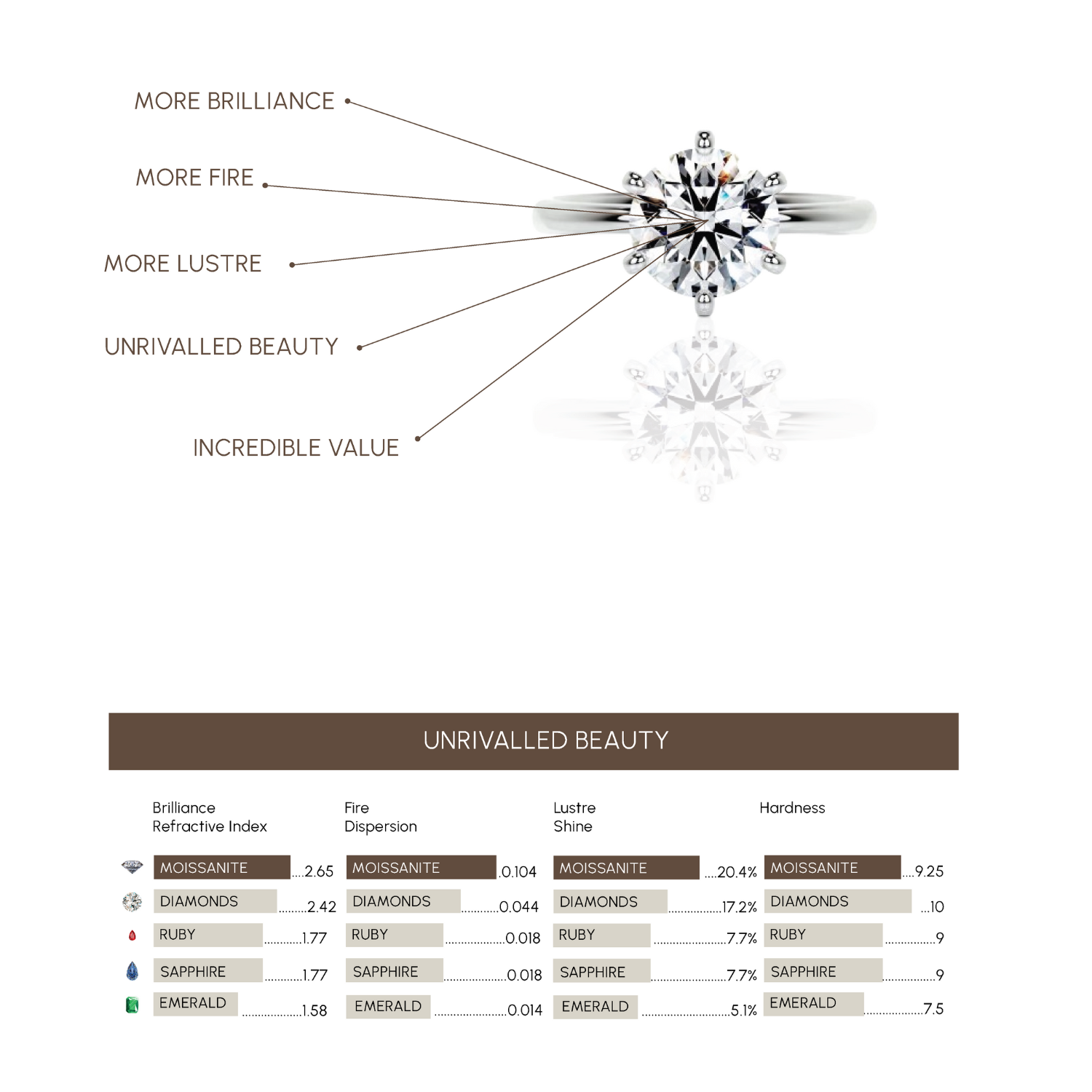
It’s All About Beauty
The Appeal Of Moissanite
Moissanite is the most stunning gemstone in the world.
Moissanite boasts unrivaled brilliance, fire, and sparkle, all of which contribute to a jewel's attractiveness.
REFRACTIVE INDEX refers to a jewel's capacity to collect and reflect light. The higher the refractive index, the brighter the jewel. Moissanite, with a refractive index of 2.65-2.69, outperforms other diamonds.
FIRE is the dispersion, or spectral separation, of white light into rainbow flashes. The more dispersion a diamond has, the more beautiful color effects it will produce. Moissanite has 2.5 times as much fire as diamond.
LUSTRE, also known as scintillation, refers to the flashes of light or sparkle that occur as a jewel moves in light. Moissanite has a luster rating of 20.4%, which is higher than a diamond's grade of 17.2%.
Moissanite, with its irresistible beauty and outstanding value, is ideal for any occasion.
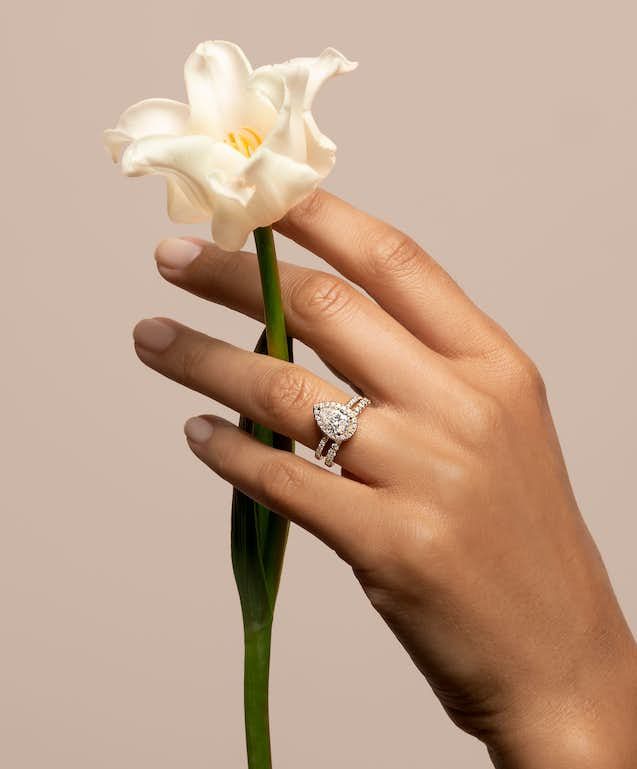
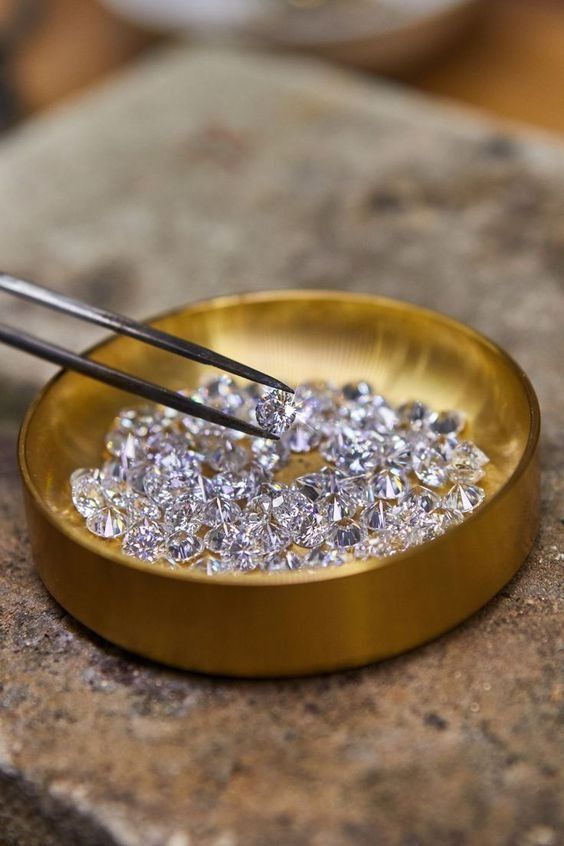
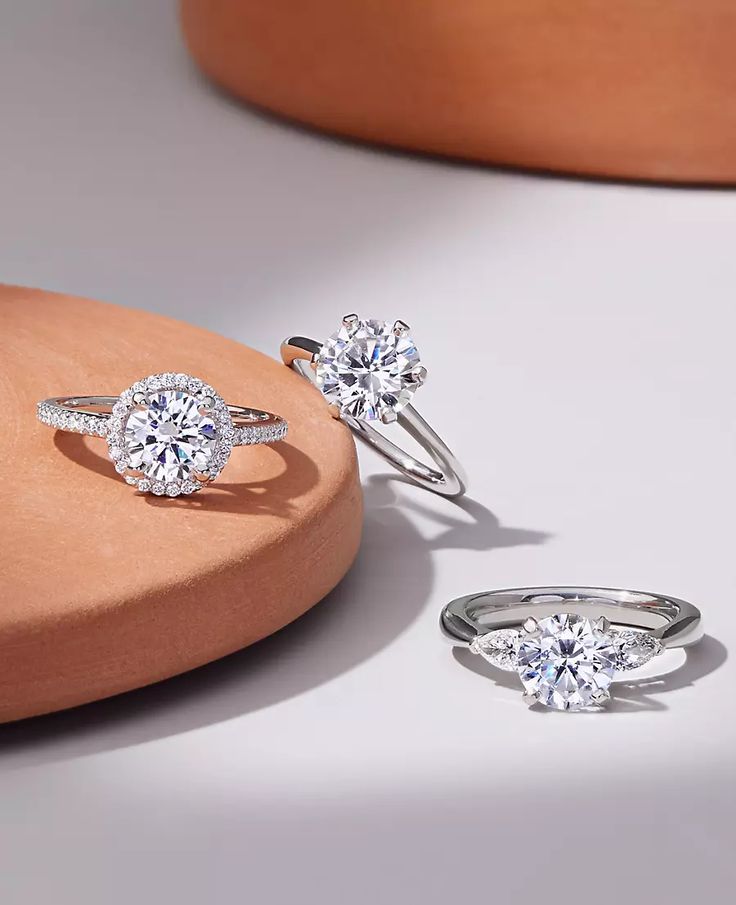
When you wear Moissanite, you are helping to create a better future for all generations.
Moissanite jewels are ethically grown in technologically advanced facilities, ensuring they are conflict-free and have no negative social or environmental impact.
A jewel's durability is determined by its ability to endure temperatures and chemicals. Moissanite is more heat resistant than diamonds, making heat damage during jewelry creation and maintenance extremely improbable.
Moissanite measures 9 ¼ on the Mohs scale. Its extraordinarily high hardness makes scratches and abrasions extremely rare, even after years of daily use.
All Moissanite gems come with an Authenticity Card, which confirms that your Moissanite is an actual Moissanite International jewel.
Moissanite VS Lab Grown Diamond
Moissanite and lab-grown diamonds are both popular alternatives to natural diamonds, each with its own set of characteristics.
Moissanite
Composed of silicon carbide (SiC) and is a distinct mineral with its own unique properties. It has a different crystal structure than diamonds.
Lab Grown Diamond
Composed of carbon atoms arranged in a crystal lattice structure, identical to natural diamonds.
Very hard, ranking 9.25 on the Mohs scale of hardness. It is durable and suitable for everyday wear.
Shares the same hardness as natural diamonds, ranking 10 on the Mohs scale, making it the hardest known material.
Exhibits a high degree of brilliance and fire, often displaying more colorful flashes of light than diamonds.
Displays a similar level of brilliance and sparkle to natural diamonds, characterized by white light reflections.
Generally exhibits more rainbow-like flashes of color, especially under certain lighting conditions.
Can be produced with a range of colors, but high-quality diamonds are typically colorless or near-colorless.
More affordable than both natural and lab-grown diamonds, making it a popular choice for budget-conscious buyers.
Usually more affordable than natural diamonds but can still vary in price based on factors such as size, quality, and cut.
Discovered in meteorites, but moissanite used in jewelry is typically created in a lab.
Created in controlled laboratory conditions, replicating the natural diamond formation process.
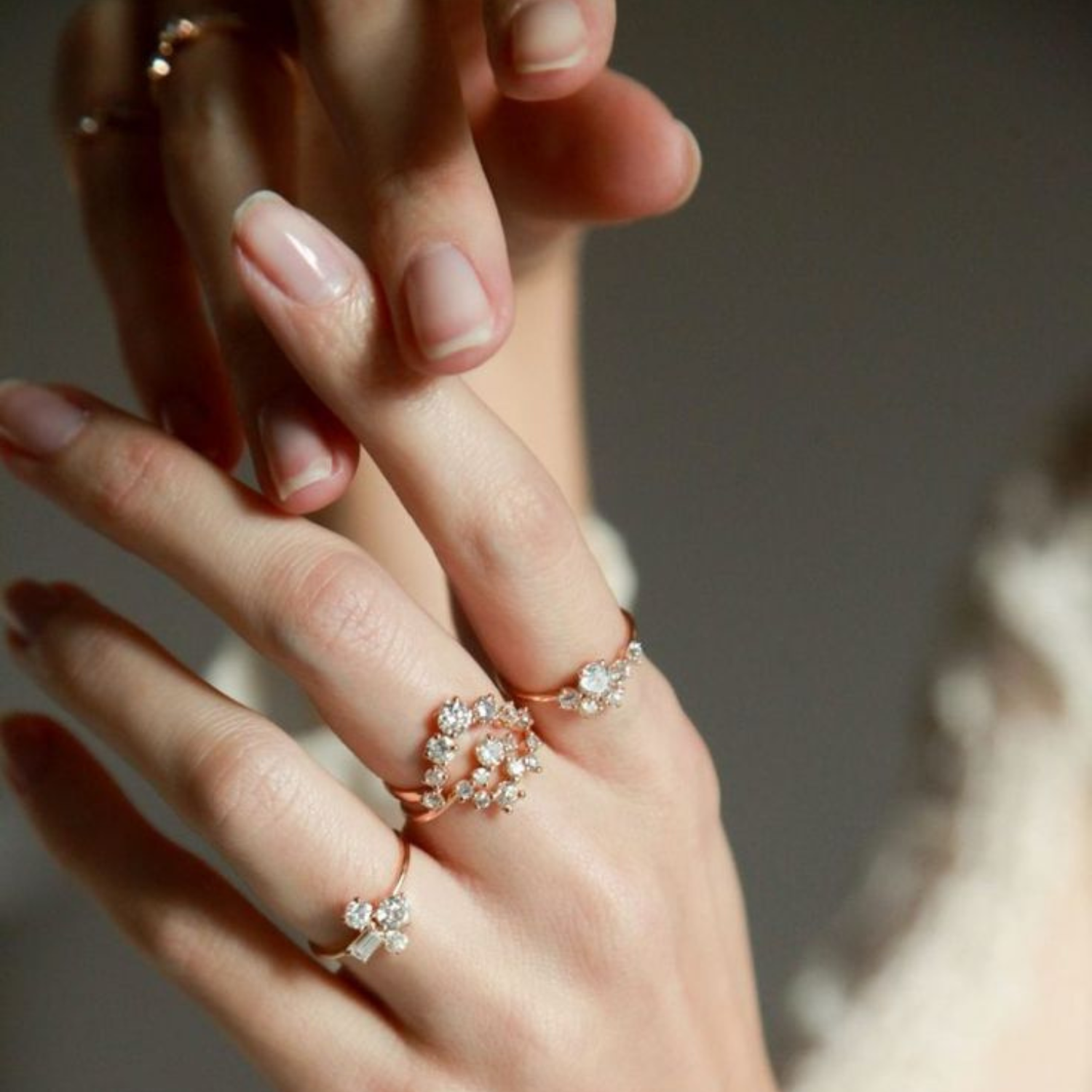
Authenticity & Grading
Laser Engraving Identification
Each Eternal Brilliance Stone is one-of-a-kind and has a unique code laser engraved on the moissanite girdle. This ensures both authenticity and stone identification. This identification inscription is not visible with the naked eye and does not impair the cut of your moissanite stone.
Certificate of Authenticity
With your finished ring, you will also receive an official Eternal Brilliance Certificate of Authenticity. Our Authenticity Certificates are digital and encrypted, and each is unique to the corresponding moissanite gemstone. We use digital reports because they connect with our ethical values and help us reduce our carbon footprint. We can, however, publish your report on request.
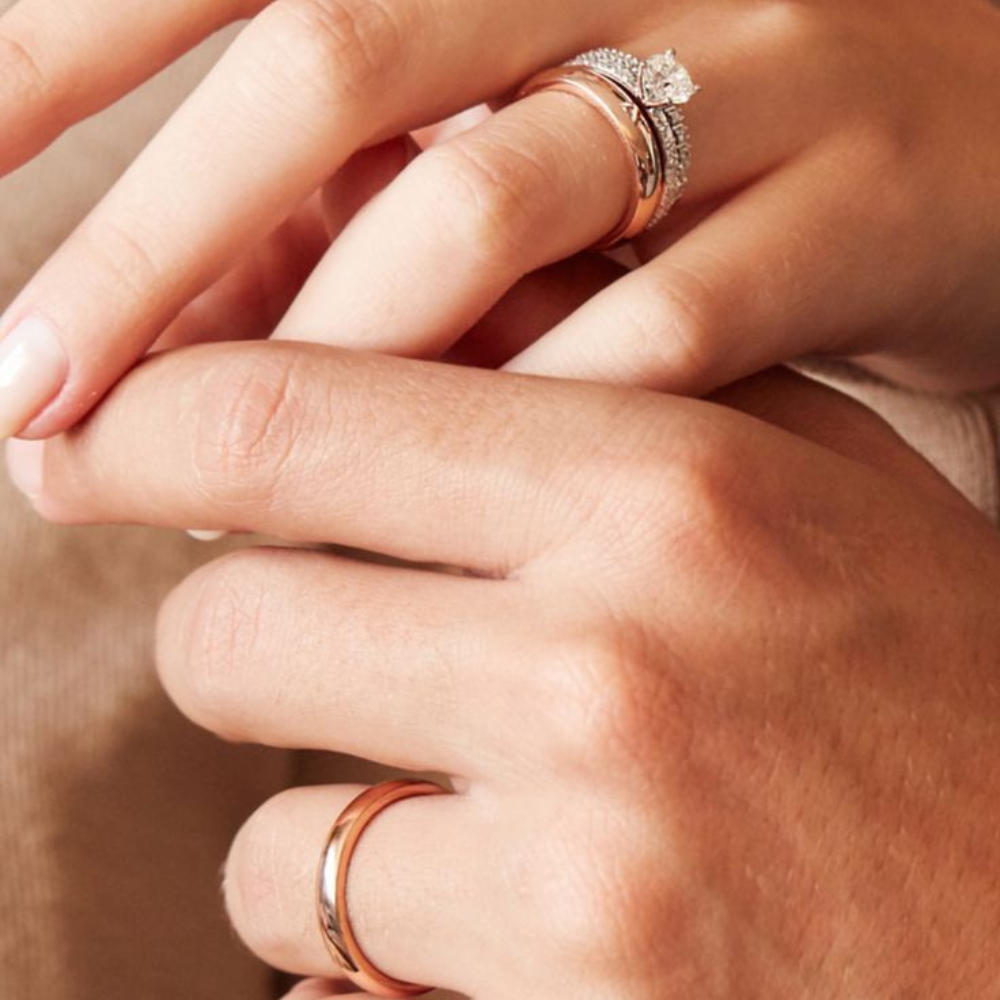
Choosing Your Gemstone
Moissanite or Cultured Diamond?
Moissanite, like sapphires and emeralds, is a unique gemstone in and of itself. Moissanite, on the other hand, has the same durability as diamonds and an incredible visual resemblance to diamonds, making it an ideal choice for bridal jewelry.
Moissanite is a more reasonable option than cultured diamonds, with prices ranging from $1,200 to $5,000. Moissanite lets you to have your fantasy ring design and carat size while staying within a fair price.
A moissanite is the ideal choice for someone who wants the highest quality diamond replacement that is both ethical and cheap.
Moissanite FAQ’s
How is Moissanite made?
Moissanite is created through a thermal growing process using the natural mineral Silicon Carbide.
Moissanite is then hand cut to maximise its brilliance and fire.
Where does the name moissanite come from?
Moissanite was named in honour of its discoverer, french nobel prize-winner, dr. henri moissan.
Is moissanite graded like the four c's?
While it looks like diamond, moissanite is a different jewel than diamond with a different chemical composition.
as such, moissanite is not graded using the diamond grading system.
Why do you say moissanite has more brilliance?
The refractive index (ri) of a gemstone is the most important optical property affecting its potential brilliance (sparkle).
with an ri of 2.65-2.69, moissanite displays more brilliance than diamond (ri 2.42) or any other popular gemstone,
such as ruby (ri 1.77) and sapphire (ri 1.77).
What gives moissanite its superior fire?
Moissanite’s properties and master cutting creates high dispersion (“fire”).
moissanite’s dispersion is 0.104, which means it has more fire than diamond at 0.044.
fire is one of the three attributes that make up the beauty of a jewel, along with brilliance and lustre.
Will moissanite scratch or break easily?
While moissanite and diamond jewellery is extremely hard, durable and resistant to abrasion and chipping, like all other gemstones, they are not indestructible. care for your moissanite jewellery just as you would other fine jewellery, taking precautions not to wear rings and bracelets when doing rough work.
Do people buy moissanite rings for engagement and weddings?
Yes! due to moissanite’s beauty, durability, value and brilliance that lasts forever, it is very popular for engagement rings.






